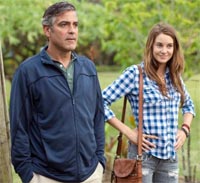 | « Back to article | Print this article |
 There is hardly a person in the engaging drama The Descendants, who is without flaws. While that is a universal truth about most human beings, director Alexander Payne (Sideways, About Schmidt and Election, all box office and critical hits), in his first film in seven years, has made a movie which is a gentle comic drama full of surprises and wonderful performances.
There is hardly a person in the engaging drama The Descendants, who is without flaws. While that is a universal truth about most human beings, director Alexander Payne (Sideways, About Schmidt and Election, all box office and critical hits), in his first film in seven years, has made a movie which is a gentle comic drama full of surprises and wonderful performances.
The film is shaping into a moderate hit (even before the major nominations are announced) with a $24 million gross in North America in four weeks of limited release. The movie, which cost a reported $50 million, will be adding hundreds of theatres to its current 800 theatre count in North America but also in major markets abroad when it begins rolling out in the next two weeks.
Just as the Golden Globe nominations are being finalised, The Descendants has been declared the best film of the year by the Los Angeles Film Critics Association.
George Clooney, arguably in his best work in two decades in the films, is a middle-aged millionaire in Hawaii who readily confesses in a brief voiceover that he simply had the good luck to be born the descendant of a white missionary married a Hawaiian princess.
But his good luck is challenged when his estranged wife falls into a coma after a boating accident. He begins to minister to her needs and gets to connect to his daughters.
However, we soon learn that it is not all altruism. While he is doing some good, he also wants to dig into his wife's past so that he can present a better picture of himself.
He also faces a number of moral quandaries. Does he sell the family estate to a developer, as his relatives are urging? Does he take advantage of his wife's helplessness to settle a few old scores, use her enforced silence to finally tell their friends his side of things?
When you see long lines at the media screening of a film at a film festival, you have a feeling that the film could be interesting. At the Toronto International Film Festival in September, the George Clooney's dysfunctional family saga The Descendants had perhaps the longest lines of critics and reporters. And then came the glowing reviews. The TIFF has over more than three decades has generated critical and mass acclaim to create Oscar buzz for many films with a significant number of them like Slumdog Millionaire and An American Beauty turning out to be major Oscar winners.
The Descendants, a heart warming and stirring drama with sterling performances, stands a solid chance of getting major nominations, and maybe even wins.
For Fox Searchlight, the distributor of such highly successful Oscar winners as Black Swan and Slumdog Millionaire, surely has a winner. It is yet to open abroad, and given Clooney's popularity in Europe, it could be a big winner.
Reviews are important in making films such as The Descendants grow, and few films this year have won such praise as this film, from The New York Times to Entertainment Weekly. While some films such as the sexual addiction show Shame win great praise, their appeal is limited because of their grim nature but here is a film which is unpredictably funny, moving and thought provoking, with a strong appeal to the critics and sophisticated and general audiences.
Salon wrote: 'I've seen better and more adventurous movies than this; I've seen some this week. But The Descendants is gentle, witty, audience-friendly entertainment for grown-ups, with a great performance by one of our biggest screen stars.'
In Entertainment Weekly, Payne's long-awaited new film, was called 'another beautifully chiseled piece of filmmaking -- sharp, funny, generous, and moving -- that writes its own rules as much as About Schmidt or Sideways did.'
The review added: 'In a funny way, Payne has become the Stanley Kubrick of serious American comedy: He takes forever to make a movie, searching every time (as Kubrick did) for the perfect book to adapt. But when he finally discovers it and gets rolling (in this case, it's a novel by Kaui Hart Hemmings), he turns each film into a masterfully realized and inhabited universe.'
Payne told Indiewire recently why he likes to adapt books.
'The big example here is Kubrick,' he said. 'I think 11 of his 13 features were adaptations. You get from books the suggestion of a storyline or a world that you yourself never could've thought up in a million years. This Kaui Hart Hemmings book. I could never have thought up any of that stuff, but I'm sure glad I that I found it. I'm sorry to use a cliché, but these are more the types of moves we had in the '70s, movies made in a modern cinematic vernacular that are just about life, and seeking to avoid the movie contrivances that so dominate our cinema today.'
The audiences for his films are not just those who grew up with the films of the 1970s or 1980s but also enthusiastic followers who wonder why they should wait for seven years to see his new film.
On the surface, The Descendants might seem to some as a solid comedy with good performances. But a second watching will reveal many of its layers, and the strengths and weaknesses of its principal characters.